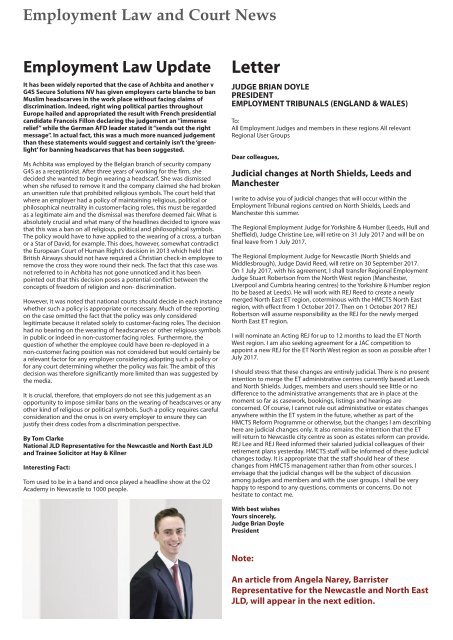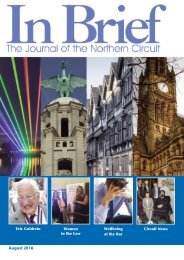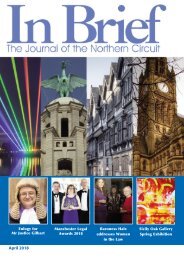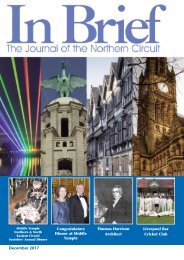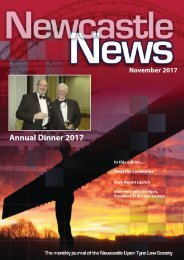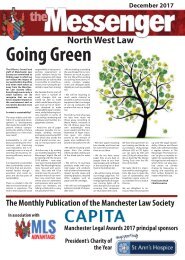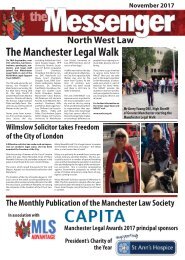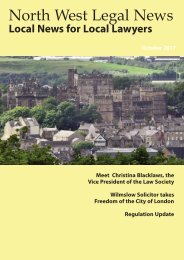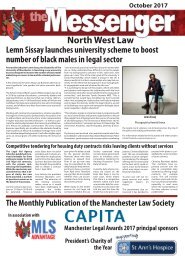Newcastle News June 2017
Create successful ePaper yourself
Turn your PDF publications into a flip-book with our unique Google optimized e-Paper software.
Employment Law and Court <strong>News</strong><br />
Employment Law Update<br />
It has been widely reported that the case of Achbita and another v<br />
G4S Secure Solutions NV has given employers carte blanche to ban<br />
Muslim headscarves in the work place without facing claims of<br />
discrimination. Indeed, right wing political parties throughout<br />
Europe hailed and appropriated the result with French presidential<br />
candidate Francois Fillon declaring the judgement an ‘’immense<br />
relief’’ while the German AFD leader stated it ‘’sends out the right<br />
message’’. In actual fact, this was a much more nuanced judgement<br />
than these statements would suggest and certainly isn’t the ‘greenlight’<br />
for banning headscarves that has been suggested.<br />
Ms Achbita was employed by the Belgian branch of security company<br />
G4S as a receptionist. After three years of working for the firm, she<br />
decided she wanted to begin wearing a headscarf. She was dismissed<br />
when she refused to remove it and the company claimed she had broken<br />
an unwritten rule that prohibited religious symbols. The court held that<br />
where an employer had a policy of maintaining religious, political or<br />
philosophical neutrality in customer-facing roles, this must be regarded<br />
as a legitimate aim and the dismissal was therefore deemed fair. What is<br />
absolutely crucial and what many of the headlines decided to ignore was<br />
that this was a ban on all religious, political and philosophical symbols.<br />
The policy would have to have applied to the wearing of a cross, a turban<br />
or a Star of David, for example. This does, however, somewhat contradict<br />
the European Court of Human Right’s decision in 2013 which held that<br />
British Airways should not have required a Christian check-in employee to<br />
remove the cross they wore round their neck. The fact that this case was<br />
not referred to in Achbita has not gone unnoticed and it has been<br />
pointed out that this decision poses a potential conflict between the<br />
concepts of freedom of religion and non- discrimination.<br />
However, it was noted that national courts should decide in each instance<br />
whether such a policy is appropriate or necessary. Much of the reporting<br />
on the case omitted the fact that the policy was only considered<br />
legitimate because it related solely to customer-facing roles. The decision<br />
had no bearing on the wearing of headscarves or other religious symbols<br />
in public or indeed in non-customer facing roles. Furthermore, the<br />
question of whether the employee could have been re-deployed in a<br />
non-customer facing position was not considered but would certainly be<br />
a relevant factor for any employer considering adopting such a policy or<br />
for any court determining whether the policy was fair. The ambit of this<br />
decision was therefore significantly more limited than was suggested by<br />
the media.<br />
It is crucial, therefore, that employers do not see this judgement as an<br />
opportunity to impose similar bans on the wearing of headscarves or any<br />
other kind of religious or political symbols. Such a policy requires careful<br />
consideration and the onus is on every employer to ensure they can<br />
justify their dress codes from a discrimination perspective.<br />
By Tom Clarke<br />
National JLD Representative for the <strong>Newcastle</strong> and North East JLD<br />
and Trainee Solicitor at Hay & Kilner<br />
Interesting Fact:<br />
Tom used to be in a band and once played a headline show at the O2<br />
Academy in <strong>Newcastle</strong> to 1000 people.<br />
Letter<br />
JUDGE BRIAN DOYLE<br />
PRESIDENT<br />
EMPLOYMENT TRIBUNALS (ENGLAND & WALES)<br />
To:<br />
All Employment Judges and members in these regions All relevant<br />
Regional User Groups<br />
Dear colleagues,<br />
Judicial changes at North Shields, Leeds and<br />
Manchester<br />
I write to advise you of judicial changes that will occur within the<br />
Employment Tribunal regions centred on North Shields, Leeds and<br />
Manchester this summer.<br />
The Regional Employment Judge for Yorkshire & Humber (Leeds, Hull and<br />
Sheffield), Judge Christine Lee, will retire on 31 July <strong>2017</strong> and will be on<br />
final leave from 1 July <strong>2017</strong>.<br />
The Regional Employment Judge for <strong>Newcastle</strong> (North Shields and<br />
Middlesbrough), Judge David Reed, will retire on 30 September <strong>2017</strong>.<br />
On 1 July <strong>2017</strong>, with his agreement, I shall transfer Regional Employment<br />
Judge Stuart Robertson from the North West region (Manchester,<br />
Liverpool and Cumbria hearing centres) to the Yorkshire & Humber region<br />
(to be based at Leeds). He will work with REJ Reed to create a newly<br />
merged North East ET region, coterminous with the HMCTS North East<br />
region, with effect from 1 October <strong>2017</strong>. Then on 1 October <strong>2017</strong> REJ<br />
Robertson will assume responsibility as the REJ for the newly merged<br />
North East ET region.<br />
I will nominate an Acting REJ for up to 12 months to lead the ET North<br />
West region. I am also seeking agreement for a JAC competition to<br />
appoint a new REJ for the ET North West region as soon as possible after 1<br />
July <strong>2017</strong>.<br />
I should stress that these changes are entirely judicial. There is no present<br />
intention to merge the ET administrative centres currently based at Leeds<br />
and North Shields. Judges, members and users should see little or no<br />
difference to the administrative arrangements that are in place at the<br />
moment so far as casework, bookings, listings and hearings are<br />
concerned. Of course, I cannot rule out administrative or estates changes<br />
anywhere within the ET system in the future, whether as part of the<br />
HMCTS Reform Programme or otherwise, but the changes I am describing<br />
here are judicial changes only. It also remains the intention that the ET<br />
will return to <strong>Newcastle</strong> city centre as soon as estates reform can provide.<br />
REJ Lee and REJ Reed informed their salaried judicial colleagues of their<br />
retirement plans yesterday. HMCTS staff will be informed of these judicial<br />
changes today. It is appropriate that the staff should hear of these<br />
changes from HMCTS management rather than from other sources. I<br />
envisage that the judicial changes will be the subject of discussion<br />
among judges and members and with the user groups. I shall be very<br />
happy to respond to any questions, comments or concerns. Do not<br />
hesitate to contact me.<br />
With best wishes<br />
Yours sincerely,<br />
Judge Brian Doyle<br />
President<br />
Note:<br />
An article from Angela Narey, Barrister<br />
Representative for the <strong>Newcastle</strong> and North East<br />
JLD, will appear in the next edition.


